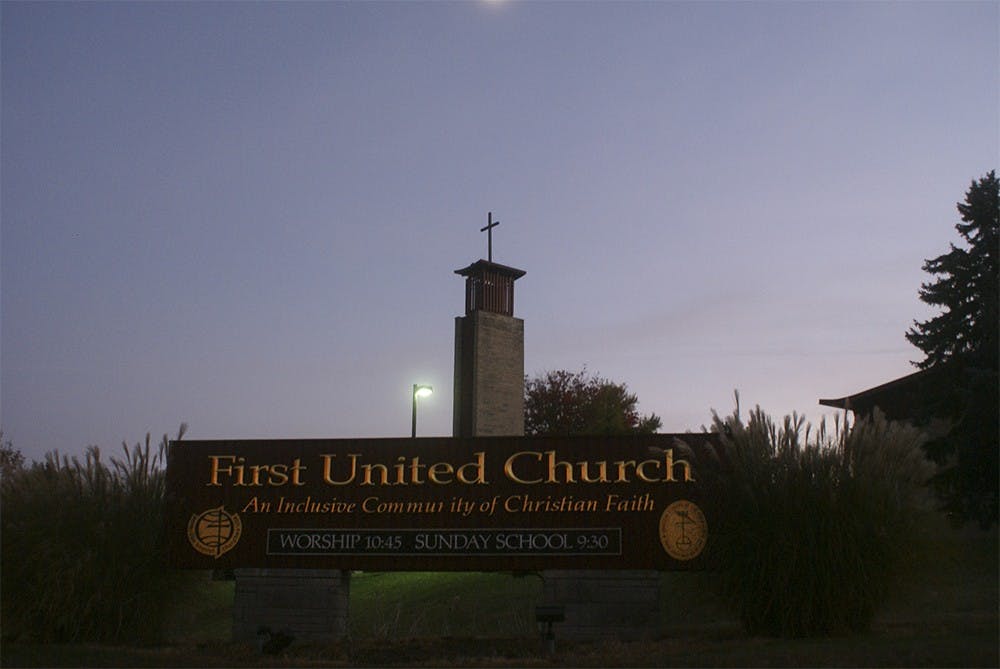The lead minister at First United Church, Skiles said he is happy to admit there are things he doesn’t and will never know.
“I consider myself a happy agnostic,” Skiles said.
When he thinks of God, he said he uses a philosophical lens that determines what God is not, and considers what God is. But he said he can never know, only hypothesize. Skiles said he is content with this, and he is not alone.
As he stands in the pulpit to speak each Sunday, adherents of different beliefs extend before him. Great faith, little faith or no faith, Skiles said all of them are drawn to First United.
If most churches operate under set belief structures, First United breaks the mold — or completely ignores it.
“We don’t have a belief system here,” Skiles said. “We take Jesus pretty seriously, and we struggle to try to understand how we might live as he did in the 21st century.”
Consequently, the church is involved with a myriad of secular social services: providing rooms for HeadStart Program, holding food for Area 10 and gathering snack food for women who go to Planned Parenthood for abortions.
“It’s not important how we’re different — it’s what we do,” Skiles said.
Lisa Stanger, the church’s office manager, said the building is often almost overloaded.
“We host Opportunity House, Middle Way House, Kiwanis,” Stanger said. “We’re here for people who have no place to go.”
Stanger and Skiles said it isn’t unusual for Alcoholics or Narcotics Anonymous groups to find themselves displaced. Often, churches charge for the use of their building, regardless of who is using it.
First United told the groups they could meet without charge.
It’s not just groups that benefit from the church’s open-door policy. Stanger said an Indian family had come to the church once as a last resort.
They wanted to have a celebratory event similar to a wedding shower, they but didn’t have the space and couldn’t afford to rent a room. They heard of First United by word of mouth and arrived hopeful.
“We were like, ‘Yeah, you can use our building,’” Stanger said.
Skiles said that was part of the church’s mission.
“We’ve got this grand building, and we’re trying to give it away,” he said.
Skiles emphasized his church’s commitment to give money away but admitted the number could always be higher.
“Of our income, we try to give 20 percent of it away,” Skiles said.
Stanger said the church gives away roughly $20,000 each year.
According to an annual report the church released detailing its budget and future goals, the money goes to places like Stonebelt, Habitat for Humanity, Middle Way House, Girls Inc. of Monroe County and other non-profits. Skiles said when the church received a one million-dollar gift, they gave $100,000 of it to Community Kitchen for construction costs.
Skiles said despite the positive effect the church aims to have, there has been backlash in the past. Skiles said he could remember picketing when he started working at the church nearly 10 years ago.
“That doesn’t happen as much anymore,” he said. “But it used to.”
Skiles said he credits that to a loss of momentum for the protesters and a reluctant acceptance that, despite efforts to the contrary, First United will continue to live out a liberal theology.
“Our people will walk through picket lines at Planned Parenthood to give food,” Skiles said. “We’re (about) caring for people who need what we have.”
But there is one area Skiles said still needs improvement.
In the annual report, Immediate Past President of the Congregation Dave Edgerton implored his congregants to continue to focus on diversity.
“I want to use this ... opportunity to express my earnest hope that will make every effort to broaden and strengthen our commitment to diversity by actively reaching out to ... racial and ethnic minorities at IU and across the greater Bloomington community,” Edgerton wrote.
Skiles said there were “a lot of white people” at First United. He has seen that change, but he wants more, he said.
“When we started HeadStart, we got more people of color walking through these halls,” Skiles said. “I want to see more of that.”






